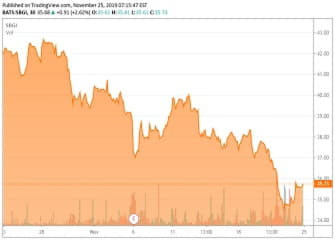
Summary
- Sinclair's exposure to its RSNs is now higher than the company's book value. It is now a sports company, not a broadcast company.
- The company wisely put its RSN holdings in a bankruptcy remote subsidiary, but even if that keeps it out of bankruptcy, there is no path to upside without successful RSNs.
- Sinclair's capital market access appears to already be impaired as a result of the RSN deals.
- Last quarter, DISH dropped Sinclair's nets and AT&T kept them. AT&T suffered massive subscriber losses from price hikes, while DISH reported the highest subscriber growth in years.
- This could well portend a market-wide shift against further rate increases for RSNs, and potentially even cuts.
Sinclair Broadcasting Group (SBGI) has been on quite the roller-coaster ride. It is now trading at $35 per share, down from $60 just a few months ago, which in turn reflected a massive one-week jump from $45 per share just a few days prior. The cause of all these oscillations is the company’s bold new foray into Regional Sports Networks (RSNs). While there are other aspects of the company’s operations, investors should do their due diligence on - a fellow contributor wrote a strong article just now - the focus of this piece will be the RSNs.
In a nutshell, RSNs are the pivotal focal point of the company’s future. The stock will rise and fall almost solely on their success, or lack thereof. My own take: while Sinclair’s gamble could succeed, the odds do not favor it, and the RSN venture is more likely to fail. I am staying away from Sinclair despite this dip in the shares.
Transforming The Company
It was back on May 3rd that Sinclair was first reported to have placed the top bid for the RSNs, with the exception of YES Network, for which a separate deal was required that I’ll come to in a bit. We should be clear at the outset that nothing less than Sinclair’s future as a going concern is riding on the outcome, regardless of whether you believe Sinclair’s gamble on RSNs is a good one or a bad one.
Sinclair trades with a market cap of under $3.4 billion as of this writing. With the company buying $10.6 billion of RSNs outright and buying a stake in another $3.5 billion worth with YES Network, this deal is nothing less than absolutely transformative for Sinclair.
And potentially debilitating if it goes wrong. Even with Sinclair housing the RSNs in a bankruptcy remote subsidiary, it has committed enough of the parent company’s capital to the endeavor that it would have difficulty surviving its collapse. Certainly, reaching the kind of profit levels that would justify substantial share appreciation would be almost impossible.
It’s possible that Sinclair itself wasn’t expecting to get this exposed and simply found itself in this position when the company considered itself to be too deeply committed to the process to pull out. Sinclair had reportedly reached out to Amazon (AMZN) for a potential partnership, and there was the chance that MLB itself could get in on the partnership as well. But MLB was reportedly bidding for the RSNs on its own at one point too.
At any rate, the partnership didn’t really materialize, at least not at a scale large enough to alter the risk profile.
So, for now, Sinclair is on its own.


































